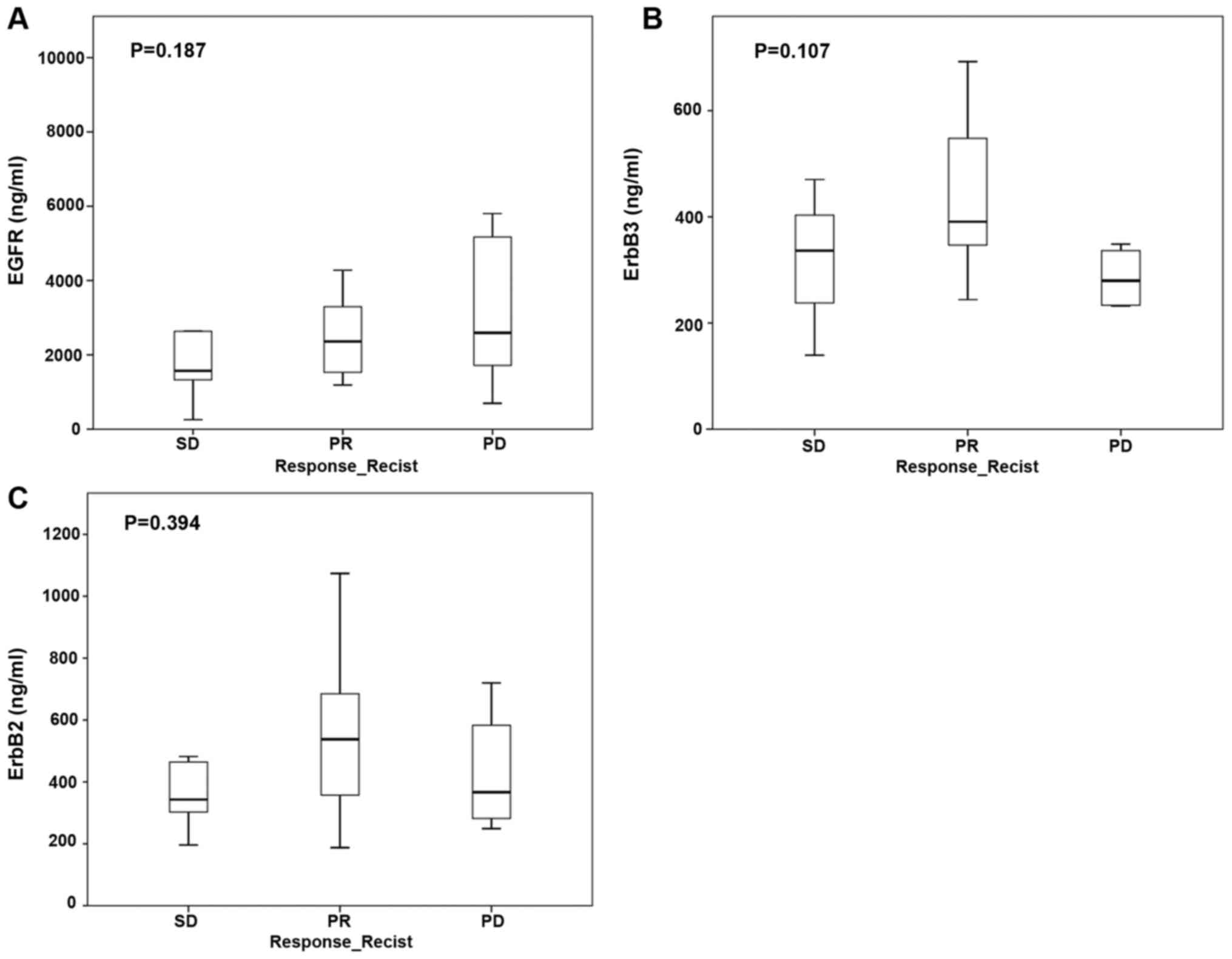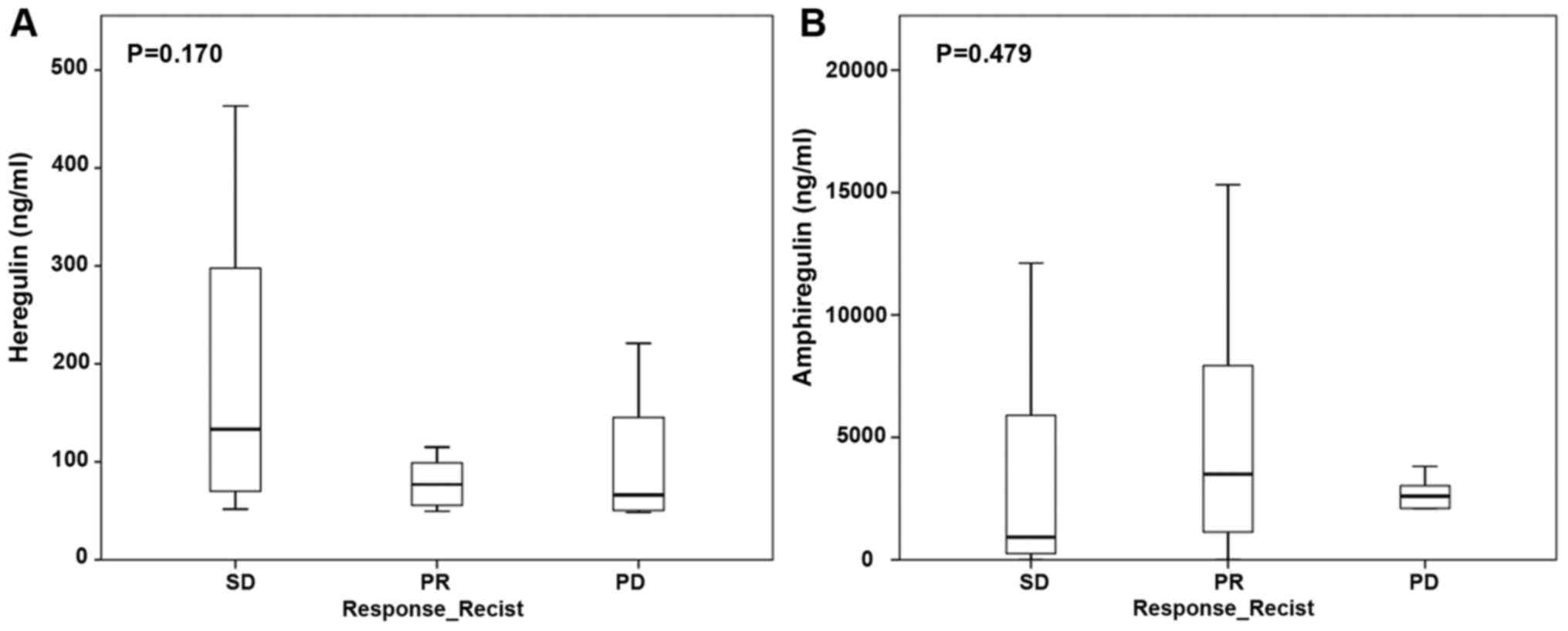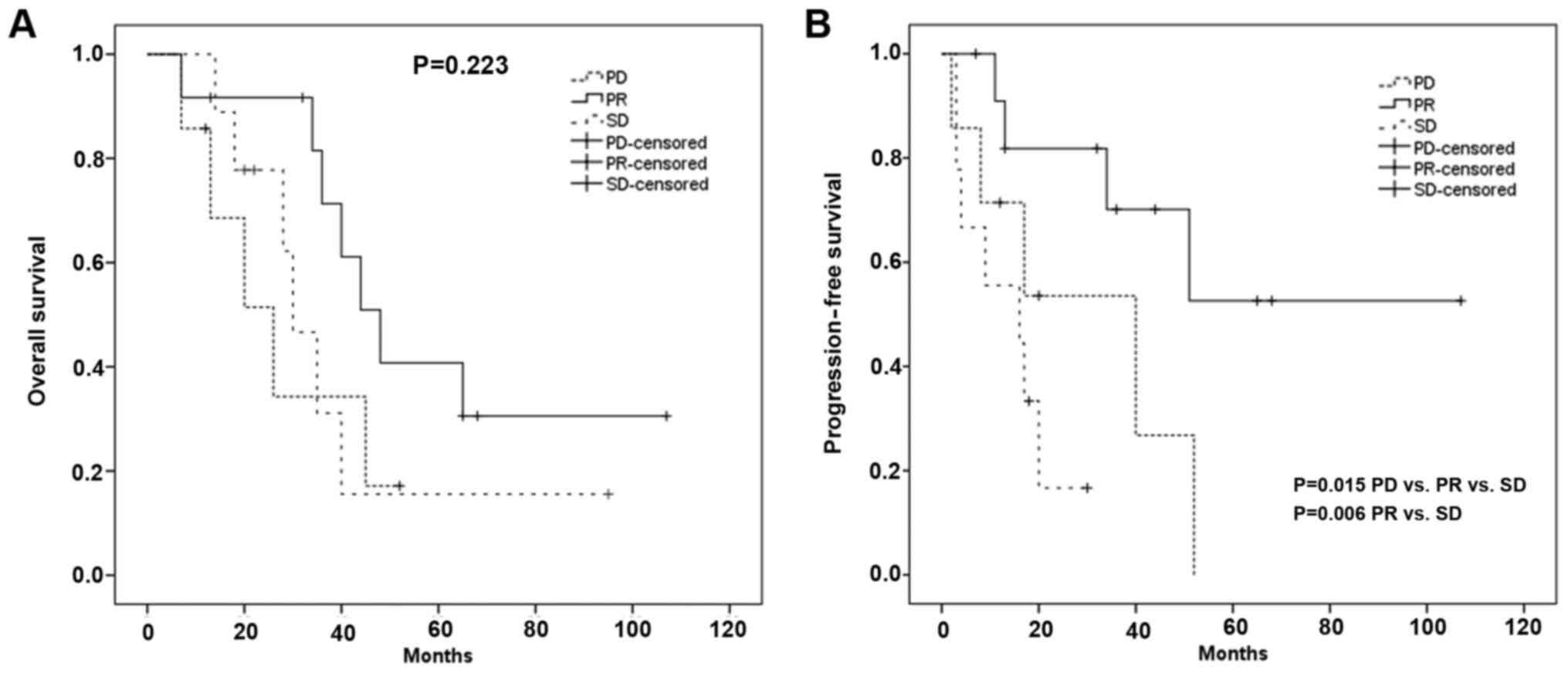|
1
|
Soerjomataram I, Lortet-Tieulent J, Parkin
DM, Ferlay J, Mathers C, Forman D and Bray F: Global burden of
cancer in 2008: A systematic analysis of disability-adjusted
life-years in 12 world regions. Lancet. 380:1840–1850. 2012.
View Article : Google Scholar : PubMed/NCBI
|
|
2
|
Douillard JY, Oliner KS, Siena S,
Tabernero J, Burkes R, Barugel M, Humblet Y, Bodoky G, Cunningham
D, Jassem J, et al: Panitumumab-FOLFOX4 treatment and RAS mutations
in colorectal cancer. N Engl J Med. 369:1023–1034. 2013. View Article : Google Scholar : PubMed/NCBI
|
|
3
|
Mody K, Baldeo C and Bekaii-Saab T:
Antiangiogenic Therapy in Colorectal Cancer. Cancer J. 24:165–170.
2018. View Article : Google Scholar : PubMed/NCBI
|
|
4
|
Van Cutsem E, Köhne CH, Hitre E, Zaluski
J, Chang Chien CR, Makhson A, D'Haens G, Pintér T, Lim R, Bodoky G,
et al: Cetuximab and chemotherapy as initial treatment for
metastatic colorectal cancer. N Engl J Med. 360:1408–1417. 2009.
View Article : Google Scholar : PubMed/NCBI
|
|
5
|
Misale S, Di Nicolantonio F,
Sartore-Bianchi A, Siena S and Bardelli A: Resistance to anti-EGFR
therapy in colorectal cancer: From heterogeneity to convergent
evolution. Cancer Discov. 4:1269–1280. 2014. View Article : Google Scholar : PubMed/NCBI
|
|
6
|
Ferrara N, Hillan KJ and Novotny W:
Bevacizumab (Avastin), a humanized anti-VEGF monoclonal antibody
for cancer therapy. Biochem Biophys Res Commun. 333:328–335. 2005.
View Article : Google Scholar : PubMed/NCBI
|
|
7
|
Itatani Y, Kawada K, Yamamoto T and Sakai
Y: Resistance to Anti-Angiogenic Therapy in Cancer-Alterations to
Anti-VEGF Pathway. Int J Mol Sci. 19:12322018. View Article : Google Scholar : PubMed/NCBI
|
|
8
|
McCormack PL and Keam SJ: Bevacizumab: A
review of its use in metastatic colorectal cancer. Drugs.
68:487–506. 2008. View Article : Google Scholar : PubMed/NCBI
|
|
9
|
Van Cutsem E, Cervantes A, Nordlinger B,
Arnold D and group EGW; ESMO Guidelines Working Group, : Metastatic
colorectal cancer: ESMO Clinical Practice Guidelines for diagnosis,
treatment and follow-up. Ann Oncol. 25 (Suppl 3):iii1–iii9. 2014.
View Article : Google Scholar
|
|
10
|
Yarden Y: The EGFR family and its ligands
in human cancer. signalling mechanisms and therapeutic
opportunities. Eur J Cancer. 37 (Suppl 4):S3–S8. 2001. View Article : Google Scholar
|
|
11
|
Olayioye MA, Neve RM, Lane HA and Hynes
NE: The ErbB signaling network: Receptor heterodimerization in
development and cancer. EMBO J. 19:3159–3167. 2000. View Article : Google Scholar : PubMed/NCBI
|
|
12
|
Yamaoka T, Ohba M and Ohmori T:
Molecular-Targeted Therapies for Epidermal Growth Factor Receptor
and Its Resistance Mechanisms. Int J Mol Sci. 18:24202017.
View Article : Google Scholar : PubMed/NCBI
|
|
13
|
Petrelli F, Borgonovo K, Cabiddu M,
Ghilardi M and Barni S: Cetuximab and panitumumab in KRAS wild-type
colorectal cancer: A meta-analysis. Int J Colorectal Dis.
26:823–833. 2011. View Article : Google Scholar : PubMed/NCBI
|
|
14
|
Rizzo S, Bronte G, Fanale D, Corsini L,
Silvestris N, Santini D, Gulotta G, Bazan V, Gebbia N, Fulfaro F,
et al: Prognostic vs predictive molecular biomarkers in colorectal
cancer: Is KRAS and BRAF wild type status required for anti-EGFR
therapy? Cancer Treat Rev. 36 (Suppl 3):S56–S61. 2010. View Article : Google Scholar
|
|
15
|
Karapetis CS, Khambata-Ford S, Jonker DJ,
O'Callaghan CJ, Tu D, Tebbutt NC, Simes RJ, Chalchal H, Shapiro JD,
Robitaille S, et al: K-ras mutations and benefit from cetuximab in
advanced colorectal cancer. N Engl J Med. 359:1757–1765. 2008.
View Article : Google Scholar : PubMed/NCBI
|
|
16
|
Misale S, Yaeger R, Hobor S, Scala E,
Janakiraman M, Liska D, Valtorta E, Schiavo R, Buscarino M,
Siravegna G, et al: Emergence of KRAS mutations and acquired
resistance to anti-EGFR therapy in colorectal cancer. Nature.
486:532–536. 2012. View Article : Google Scholar : PubMed/NCBI
|
|
17
|
Van Cutsem E, Lenz HJ, Köhne CH, Heinemann
V, Tejpar S, Melezínek I, Beier F, Stroh C, Rougier P, van Krieken
JH, et al: Fluorouracil, leucovorin, and irinotecan plus cetuximab
treatment and RAS mutations in colorectal cancer. J Clin Oncol.
33:692–700. 2015. View Article : Google Scholar : PubMed/NCBI
|
|
18
|
Jones C, Taylor MA and McWilliams B: The
role of cetuximab as first-line treatment of colorectal liver
metastases. HPB (Oxford). 15:11–17. 2013. View Article : Google Scholar : PubMed/NCBI
|
|
19
|
Saltz LB, Lenz HJ, Kindler HL, Hochster
HS, Wadler S, Hoff PM, Kemeny NE, Hollywood EM, Gonen M, Quinones
M, et al: Randomized phase II trial of cetuximab, bevacizumab, and
irinotecan compared with cetuximab and bevacizumab alone in
irinotecan-refractory colorectal cancer: The BOND-2 study. J Clin
Oncol. 25:4557–4561. 2007. View Article : Google Scholar : PubMed/NCBI
|
|
20
|
Jacobs B, De Roock W, Piessevaux H, Van
Oirbeek R, Biesmans B, De Schutter J, Fieuws S, Vandesompele J,
Peeters M, Van Laethem JL, et al: Amphiregulin and epiregulin mRNA
expression in primary tumors predicts outcome in metastatic
colorectal cancer treated with cetuximab. J Clin Oncol.
27:5068–5074. 2009. View Article : Google Scholar : PubMed/NCBI
|
|
21
|
Eisenhauer EA, Therasse P, Bogaerts J,
Schwartz LH, Sargent D, Ford R, Dancey J, Arbuck S, Gwyther S,
Mooney M, et al: New response evaluation criteria in solid tumours:
Revised RECIST guideline (version 1.1). Eur J Cancer. 45:228–247.
2009. View Article : Google Scholar : PubMed/NCBI
|
|
22
|
Roskoski R Jr: The ErbB/HER family of
protein-tyrosine kinases and cancer. Pharmacol Res. 79:34–74. 2014.
View Article : Google Scholar : PubMed/NCBI
|
|
23
|
Valtorta E, Martino C, Sartore-Bianchi A,
Penaullt-Llorca F, Viale G, Risio M, Rugge M, Grigioni W,
Bencardino K, Lonardi S, et al: Assessment of a HER2 scoring system
for colorectal cancer: results from a validation study. Mod Pathol.
28:1481–1491. 2015. View Article : Google Scholar : PubMed/NCBI
|
|
24
|
Cunningham D, Humblet Y, Siena S, Khayat
D, Bleiberg H, Santoro A, Bets D, Mueser M, Harstrick A, Verslype
C, et al: Cetuximab monotherapy and cetuximab plus irinotecan in
irinotecan-refractory metastatic colorectal cancer. N Engl J Med.
351:337–345. 2004. View Article : Google Scholar : PubMed/NCBI
|
|
25
|
Porebska I, Harlozińska A and Bojarowski
T: Expression of the tyrosine kinase activity growth factor
receptors (EGFR, ERB B2, ERB B3) in colorectal adenocarcinomas and
adenomas. Tumour Biol. 21:105–115. 2000. View Article : Google Scholar : PubMed/NCBI
|
|
26
|
Italiano A, Follana P, Caroli FX, Badetti
JL, Benchimol D, Garnier G, Gugenheim J, Haudebourg J, Keslair F,
Lesbats G, et al: Cetuximab shows activity in colorectal cancer
patients with tumors for which FISH analysis does not detect an
increase in EGFR gene copy number. Ann Surg Oncol. 15:649–654.
2008. View Article : Google Scholar : PubMed/NCBI
|
|
27
|
Uhlyarik A, Piurko V, Papai Z, Raso E,
Lahm E, Kiss E, Sikter M, Vachaja J, Kenessey I and Timar J: EGFR
Protein Expression in KRAS Wild-Type Metastatic Colorectal Cancer
Is Another Negative Predictive Factor of the Cetuximab Therapy.
Cancers (Basel). 12:6142020. View Article : Google Scholar : PubMed/NCBI
|
|
28
|
Laurent-Puig P, Cayre A, Manceau G, Buc E,
Bachet JB, Lecomte T, Rougier P, Lievre A, Landi B, Boige V, et al:
Analysis of PTEN, BRAF, and EGFR status in determining benefit from
cetuximab therapy in wild-type KRAS metastatic colon cancer. J Clin
Oncol. 27:5924–5930. 2009. View Article : Google Scholar : PubMed/NCBI
|
|
29
|
Personeni N, Fieuws S, Piessevaux H, De
Hertogh G, De Schutter J, Biesmans B, De Roock W, Capoen A,
Debiec-Rychter M, Van Laethem JL, et al: Clinical usefulness of
EGFR gene copy number as a predictive marker in colorectal cancer
patients treated with cetuximab: A fluorescent in situ
hybridization study. Clin Cancer Res. 14:5869–5876. 2008.
View Article : Google Scholar : PubMed/NCBI
|
|
30
|
Nagaoka T, Kitaura K, Miyata Y, Kumagai K,
Kaneda G, Kanazawa H, Suzuki S, Hamada Y and Suzuki R:
Downregulation of epidermal growth factor receptor family receptors
and ligands in a mutant K-ras group of patients with colorectal
cancer. Mol Med Rep. 13:3514–3520. 2016. View Article : Google Scholar : PubMed/NCBI
|
|
31
|
Park DI, Kang MS, Oh SJ, Kim HJ, Cho YK,
Sohn CI, Jeon WK, Kim BI, Han WK, Kim H, et al: HER-2/neu
overexpression is an independent prognostic factor in colorectal
cancer. Int J Colorectal Dis. 22:491–497. 2007. View Article : Google Scholar : PubMed/NCBI
|
|
32
|
Conradi LC, Styczen H, Sprenger T, Wolff
HA, Rödel C, Nietert M, Homayounfar K, Gaedcke J, Kitz J,
Talaulicar R, et al: Frequency of HER-2 positivity in rectal cancer
and prognosis. Am J Surg Pathol. 37:522–531. 2013. View Article : Google Scholar : PubMed/NCBI
|
|
33
|
Gharib E, Salmanipour R, Nazemalhosseini
Mojarad E, Yaghoob Taleghani M, Sarlak S, Malekzade-Moghani M,
Nasrabadi PN, Meiary MA, Asadzadeh Aghdaei H and Zali MR:
HER2+ mCRC patients with exon 20 R784G substitution
mutation do not respond to the cetuximab therapy. J Cell Physiol.
234:13137–13144. 2019. View Article : Google Scholar : PubMed/NCBI
|
|
34
|
Aurisicchio L, Marra E, Roscilli G,
Mancini R and Ciliberto G: The promise of anti-ErbB3 monoclonals as
new cancer therapeutics. Oncotarget. 3:744–758. 2012. View Article : Google Scholar : PubMed/NCBI
|
|
35
|
Beji A, Horst D, Engel J, Kirchner T and
Ullrich A: Toward the prognostic significance and therapeutic
potential of HER3 receptor tyrosine kinase in human colon cancer.
Clin Cancer Res. 18:956–968. 2012. View Article : Google Scholar : PubMed/NCBI
|
|
36
|
Scartozzi M, Giampieri R, Maccaroni E,
Mandolesi A, Giustini L, Silva R, Zaniboni A, Biscotti T, Biagetti
S, Galizia E, et al: Analysis of HER-3, insulin growth factor-1,
nuclear factor-κB and epidermal growth factor receptor gene copy
number in the prediction of clinical outcome for K-RAS wild-type
colorectal cancer patients receiving irinotecan-cetuximab. Ann
Oncol. 23:1706–1712. 2012. View Article : Google Scholar : PubMed/NCBI
|
|
37
|
Lédel F, Hallström M, Ragnhammar P,
Öhrling K and Edler D: HER3 expression in patients with primary
colorectal cancer and corresponding lymph node metastases related
to clinical outcome. Eur J Cancer. 50:656–662. 2014. View Article : Google Scholar : PubMed/NCBI
|
|
38
|
Cushman SM, Jiang C, Hatch AJ, Shterev I,
Sibley AB, Niedzwiecki D, Venook AP, Owzar K, Hurwitz HI and Nixon
AB: Gene expression markers of efficacy and resistance to cetuximab
treatment in metastatic colorectal cancer: results from CALGB 80203
(Alliance). Clin Cancer Res. 21:1078–1086. 2015. View Article : Google Scholar : PubMed/NCBI
|
|
39
|
Stahler A, Heinemann V, Neumann J, Crispin
A, Schalhorn A, Stintzing S, Giessen-Jung C, Fischer von
Weikersthal L, Vehling-Kaiser U, Stauch M, et al: Prevalence and
influence on outcome of HER2/neu, HER3 and NRG1 expression in
patients with metastatic colorectal cancer. Anticancer Drugs.
28:717–722. 2017. View Article : Google Scholar : PubMed/NCBI
|
|
40
|
Busser B, Sancey L, Brambilla E, Coll JL
and Hurbin A: The multiple roles of amphiregulin in human cancer.
Biochim Biophys Acta. 1816:119–131. 2011.PubMed/NCBI
|
|
41
|
Zvibel I, Brill S, Halpern Z and Papa M:
Amphiregulin and hepatocyte-derived extracellular matrix regulate
proliferation and autocrine growth factor expression in colon
cancer cell lines of varying liver-colonizing capability. J Cell
Biochem. 76:332–340. 1999. View Article : Google Scholar : PubMed/NCBI
|
|
42
|
Jing C, Jin YH, You Z, Qiong Q and Jun Z:
Prognostic value of amphiregulin and epiregulin mRNA expression in
metastatic colorectal cancer patients. Oncotarget. 7:55890–55899.
2016. View Article : Google Scholar : PubMed/NCBI
|
|
43
|
Lo Nigro C, Ricci V, Vivenza D, Granetto
C, Fabozzi T, Miraglio E and Merlano MC: Prognostic and predictive
biomarkers in metastatic colorectal cancer anti-EGFR therapy. World
J Gastroenterol. 22:6944–6954. 2016. View Article : Google Scholar : PubMed/NCBI
|
|
44
|
Nishimura T, Andoh A, Inatomi O, Shioya M,
Yagi Y, Tsujikawa T and Fujiyama Y: Amphiregulin and epiregulin
expression in neoplastic and inflammatory lesions in the colon.
Oncol Rep. 19:105–110. 2008.PubMed/NCBI
|
|
45
|
Yamada M, Ichikawa Y, Yamagishi S,
Momiyama N, Ota M, Fujii S, Tanaka K, Togo S, Ohki S and Shimada H:
Amphiregulin is a promising prognostic marker for liver metastases
of colorectal cancer. Clin Cancer Res. 14:2351–2356. 2008.
View Article : Google Scholar : PubMed/NCBI
|
|
46
|
Seligmann JF, Elliott F, Richman SD,
Jacobs B, Hemmings G, Brown S, Barrett JH, Tejpar S, Quirke P and
Seymour MT: Combined Epiregulin and Amphiregulin Expression Levels
as a Predictive Biomarker for Panitumumab Therapy Benefit or Lack
of Benefit in Patients With RAS Wild-Type Advanced Colorectal
Cancer. JAMA Oncol. 2:633–642. 2016. View Article : Google Scholar : PubMed/NCBI
|
|
47
|
Yoshida M, Shimura T, Sato M, Ebi M,
Nakazawa T, Takeyama H and Joh T: A novel predictive strategy by
immunohistochemical analysis of four EGFR ligands in metastatic
colorectal cancer treated with anti-EGFR antibodies. J Cancer Res
Clin Oncol. 139:367–378. 2013. View Article : Google Scholar : PubMed/NCBI
|
|
48
|
Sebio A, Páez D, Salazar J,
Berenguer-Llergo A, Paré-Brunet L, Lasa A, Del Río E, Tobeña M,
Martín-Richard M, Baiget M, et al: Intergenic polymorphisms in the
amphiregulin gene region as biomarkers in metastatic colorectal
cancer patients treated with anti-EGFR plus irinotecan.
Pharmacogenomics J. 14:256–262. 2014. View Article : Google Scholar : PubMed/NCBI
|
|
49
|
Breuleux M: Role of heregulin in human
cancer. Cell Mol Life Sci. 64:2358–2377. 2007. View Article : Google Scholar : PubMed/NCBI
|
|
50
|
Khurana A, Gonzalez-Guerrico A and Lupu R:
Heregulin in breast cancer: Old story, new paradigm. Curr Pharm
Des. 20:4874–4878. 2014. View Article : Google Scholar : PubMed/NCBI
|
|
51
|
Yonesaka K, Zejnullahu K, Okamoto I, Satoh
T, Cappuzzo F, Souglakos J, Ercan D, Rogers A, Roncalli M, Takeda
M, et al: Activation of ERBB2 signaling causes resistance to the
EGFR-directed therapeutic antibody cetuximab. Sci Transl Med.
3:99ra862011. View Article : Google Scholar : PubMed/NCBI
|
|
52
|
Tsilimigras DI, Ntanasis-Stathopoulos I,
Bagante F, Moris D, Cloyd J, Spartalis E and Pawlik TM: Clinical
significance and prognostic relevance of KRAS, BRAF, PI3K and TP53
genetic mutation analysis for resectable and unresectable
colorectal liver metastases: A systematic review of the current
evidence. Surg Oncol. 27:280–288. 2018. View Article : Google Scholar : PubMed/NCBI
|
|
53
|
De Roock W, Jonker DJ, Di Nicolantonio F,
Sartore-Bianchi A, Tu D, Siena S, Lamba S, Arena S, Frattini M,
Piessevaux H, et al: Association of KRAS p.G13D mutation with
outcome in patients with chemotherapy-refractory metastatic
colorectal cancer treated with cetuximab. JAMA. 304:1812–1820.
2010. View Article : Google Scholar : PubMed/NCBI
|
|
54
|
Pietras K and Ostman A: Hallmarks of
cancer: Interactions with the tumor stroma. Exp Cell Res.
316:1324–1331. 2010. View Article : Google Scholar : PubMed/NCBI
|
|
55
|
Adams R, Brown E, Brown L, Butler R, Falk
S, Fisher D, Kaplan R, Quirke P, Richman S, Samuel L, et al FOCUS4
Trial Investigators, : Inhibition of EGFR, HER2, and HER3
signalling in patients with colorectal cancer wild-type for BRAF,
PIK3CA, KRAS, and NRAS (FOCUS4-D): A phase 2–3 randomised trial.
Lancet Gastroenterol Hepatol. 3:162–171. 2018. View Article : Google Scholar : PubMed/NCBI
|

















